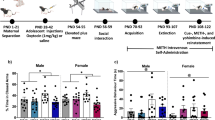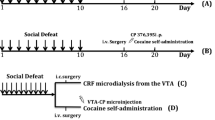Abstract
Rationale
In rodents, environmental enrichment (EE) produces both preventive and curative effects on drug addiction, and this effect is believed to depend at least in part on EE’s actions on the stress system.
Objectives
This study investigated whether exposure to EE during abstinence reduces methamphetamine seeking after extended self-administration. In addition, we investigated whether these effects are associated with alterations in the levels of glucocorticoid receptors (GR) in the brain and whether administration of GR antagonists blocks methamphetamine relapse.
Methods
We allowed rats to self-administer methamphetamine for twenty 14-h sessions. After 3 weeks of abstinence either in standard (SE) or EE conditions, we measured methamphetamine seeking in a single 3-h session. Then, we used western blot techniques to measure GR levels in several brain areas. Finally, in an independent group of rats, after methamphetamine self-administration and abstinence in SE, we administered the GR antagonist mifepristone, and we investigated methamphetamine seeking.
Results
Exposure to EE reduced methamphetamine seeking and reversed methamphetamine-induced increases in GR levels in the ventral and dorsal hippocampus. In addition, EE decreased GR levels in the amygdala in drug-naive animals, but this effect was prevented by previous exposure to methamphetamine. Administration of mifepristone significantly decreased methamphetamine seeking.
Conclusions
The anti-craving effects of EE are paralleled by restoration of methamphetamine-induced dysregulation of GR in the hippocampus. These results provide support for the hypothesis that the effect of EE on methamphetamine relapse is at least in part mediated by EE’s action on the brain stress system.





Similar content being viewed by others
References
Berger SP, Hall S, Mickalian JD et al (1996) Haloperidol antagonism of cue-elicited cocaine craving. Lancet 347:504–508. https://doi.org/10.1016/s0140-6736(96)91139-3
Blouin AM, Pisupati S, Hoffer CG, Hafenbreidel M, Jamieson SE, Rumbaugh G, Miller CA (2019) Social stress-potentiated methamphetamine seeking. Addict Biol. 24:958–968. https://doi.org/10.1111/adb.12666
Chauvet C, Lardeux V, Goldberg SR, Jaber M, Solinas M (2009) Environmental enrichment reduces cocaine seeking and reinstatement induced by cues and stress but not by cocaine. Neuropsychopharmacol Off Publ Am Coll Neuropsychopharmacol 34:2767–2778. https://doi.org/10.1038/npp.2009.127
Courtney KE, Ray LA (2014) Methamphetamine: an update on epidemiology, pharmacology, clinical phenomenology, and treatment literature. Drug Alcohol Depend 143:11–21. https://doi.org/10.1016/j.drugalcdep.2014.08.003
Crofton EJ, Zhang Y, Green TA (2015) Inoculation stress hypothesis of environmental enrichment. Neurosci Biobehav Rev 49:19–31. https://doi.org/10.1016/j.neubiorev.2014.11.017
de Jong IEM, de Kloet ER (2004) Glucocorticoids and vulnerability to psychostimulant drugs: toward substrate and mechanism. Ann N Y Acad Sci 1018:192–198. https://doi.org/10.1196/annals.1296.022
Deroche-Gamonet V, Sillaber I, Aouizerate B, Izawa R, Jaber M, Ghozland S, Kellendonk C, le Moal M, Spanagel R, Schütz G, Tronche F, Piazza PV (2003) The glucocorticoid receptor as a potential target to reduce cocaine abuse. J Neurosci Off J Soc Neurosci 23:4785–4790. https://doi.org/10.1523/JNEUROSCI.23-11-04785.2003
Enoch M-A (2011) The role of early life stress as a predictor for alcohol and drug dependence. Psychopharmacology (Berl) 214:17–31. https://doi.org/10.1007/s00213-010-1916-6
Ewing S, Ranaldi R (2018) Environmental enrichment facilitates cocaine abstinence in an animal conflict model. Pharmacol Biochem Behav 166:35–41. https://doi.org/10.1016/j.pbb.2018.01.006
Farnia V, Farshchian F, Farshchian N, Alikhani M, Sadeghi Bahmani D, Brand S (2020) Comparisons of voxel-based morphometric brain volumes of individuals with methamphetamine-induced psychotic disorder and schizophrenia spectrum disorder and healthy controls. Neuropsychobiology 79:170–178. https://doi.org/10.1159/000504576
Fiancette JF, Balado E, Piazza PV, Deroche-Gamonet V (2010) Mifepristone and spironolactone differently alter cocaine intravenous self-administration and cocaine-induced locomotion in C57BL/6 J mice. Addict Biol 15:81–87. https://doi.org/10.1111/j.1369-1600.2009.00178.x
Galaj E, Manuszak M, Ranaldi R (2016) Environmental enrichment as a potential intervention for heroin seeking. Drug Alcohol Depend 163:195–201. https://doi.org/10.1016/j.drugalcdep.2016.04.016
Galinato MH, Lockner JW, Fannon-Pavlich MJ, Sobieraj JC, Staples MC, Somkuwar SS, Ghofranian A, Chaing S, Navarro AI, Joea A, Luikart BW, Janda KD, Heyser C, Koob GF, Mandyam CD (2018) A synthetic small-molecule Isoxazole-9 protects against methamphetamine relapse. Mol Psychiatry 23:629–638. https://doi.org/10.1038/mp.2017.46
Glynn RM, Rosenkranz JA, Wolf ME, Caccamise A, Shroff F, Smith AB, Loweth JA (2018) Repeated restraint stress exposure during early withdrawal accelerates incubation of cue-induced cocaine craving. Addict Biol 23:80–89. https://doi.org/10.1111/adb.12475
Goeders NE, Guerin GF (1996) Role of corticosterone in intravenous cocaine self-administration in rats. Neuroendocrinology 64:337–348. https://doi.org/10.1159/000127137
Hart EE, Gerson JO, Izquierdo A (2018) Persistent effect of withdrawal from intravenous methamphetamine self-administration on brain activation and behavioral economic indices involving an effort cost. Neuropharmacology 140:130–138. https://doi.org/10.1016/j.neuropharm.2018.07.023
Hofford RS, Darna M, Wilmouth CE, Dwoskin LP, Bardo MT (2014) Environmental enrichment reduces methamphetamine cue-induced reinstatement but does not alter methamphetamine reward or VMAT2 function. Behav Brain Res 270:151–158. https://doi.org/10.1016/j.bbr.2014.05.007
Hofford RS, Prendergast MA, Bardo MT (2015) Pharmacological manipulation of glucocorticoid receptors differentially affects cocaine self-administration in environmentally enriched and isolated rats. Behav Brain Res 283:196–202. https://doi.org/10.1016/j.bbr.2015.01.049
Istin M, Thiriet N, Solinas M (2017) Behavioral flexibility predicts increased ability to resist excessive methamphetamine self-administration. Addict Biol. 22(4):958–966. https://doi.org/10.1111/adb.12384
Joels M, Sarabdjitsingh RA, Karst H (2012) Unraveling the time domains of corticosteroid hormone influences on brain activity: rapid, slow, and chronic modes. Pharmacol Rev 64:901–938. https://doi.org/10.1124/pr.112.005892
Kabbaj M, Yoshida S, Numachi Y, Matsuoka H, Devine DP, Sato M (2003) Methamphetamine differentially regulates hippocampal glucocorticoid and mineralocorticoid receptor mRNAs in Fischer and Lewis rats. Brain Res Mol Brain Res 117:8–14. https://doi.org/10.1016/s0169-328x(03)00257-2
Kendall JW Jr, Matsuda K, Duyck C, Greer MA (1964) Studies of the Location of the Receptor Site for Negative Feedback Control of Acth Release. Endocrinology 74:279–283. https://doi.org/10.1210/endo-74-2-279
Kolb B, Gorny G, Li Y, Samaha AN, Robinson TE (2003) Amphetamine or cocaine limits the ability of later experience to promote structural plasticity in the neocortex and nucleus accumbens. Proc Natl Acad Sci U S A 100:10523–10528. https://doi.org/10.1073/pnas.1834271100
Koob GF, Le Moal M (2001) Drug addiction, dysregulation of reward, and allostasis. Neuropsychopharmacol Off Publ Am Coll Neuropsychopharmacol 24:97–129. https://doi.org/10.1016/S0893-133X(00)00195-0
Koob GF, Le Moal M (2005) Plasticity of reward neurocircuitry and the “dark side” of drug addiction. Nat Neurosci 8:1442–1444. https://doi.org/10.1038/nn1105-1442
Koob GF, Mason BJ (2016) Existing and future drugs for the treatment of the dark side of addiction. Annu Rev Pharmacol Toxicol 56:299–322. https://doi.org/10.1146/annurev-pharmtox-010715-103143
Le Moal M, Koob GF (2007) Drug addiction: pathways to the disease and pathophysiological perspectives. Eur Neuropsychopharmacol J Eur Coll Neuropsychopharmacol 17:377–393. https://doi.org/10.1016/j.euroneuro.2006.10.006
Lü X, Zhao C, Zhang L, Ma B, Lou Z, Sun Y, Chen J, Wu W, Beveridge TJR, Zhou W, Liu Y (2012) The effects of rearing condition on methamphetamine self-administration and cue-induced drug seeking. Drug Alcohol Depend 124:288–298. https://doi.org/10.1016/j.drugalcdep.2012.01.022
Mantsch JR, Baker DA, Funk D, Lê AD, Shaham Y (2016) Stress-induced reinstatement of drug seeking: 20 years of progress. Neuropsychopharmacol Off Publ Am Coll Neuropsychopharmacol 41:335–356. https://doi.org/10.1038/npp.2015.142
McEwen BS (1999) Stress and hippocampal plasticity. Annu Rev Neurosci. 22:105–122. https://doi.org/10.1146/annurev.neuro.22.1.105
McEwen BS (2016) In pursuit of resilience: stress, epigenetics, and brain plasticity. Ann N Y Acad Sci. 1373:56–64. https://doi.org/10.1111/nyas.13020
McOmish CE, Hannan AJ (2007) Enviromimetics: exploring gene environment interactions to identify therapeutic targets for brain disorders. Expert Opin Ther Targets 11:899–913. https://doi.org/10.1517/14728222.11.7.899
Mifsud KR, Reul JMHM (2018) Mineralocorticoid and glucocorticoid receptor-mediated control of genomic responses to stress in the brain. Stress. 21:389–402. https://doi.org/10.1080/10253890.2018.1456526
Morimasa T, Wirz-Justice A, Kraeuchi K, Arendt J, Baumann J, Haeusler A, Degen P, Feer H (1987) Chronic methamphetamine and its withdrawal modify behavioral and neuroendocrine circadian rhythms. Physiol Behav 39:699–705. https://doi.org/10.1016/0031-9384(87)90253-8
Novaes LS, Dos Santos NB, Batalhote RFP et al (2017) Environmental enrichment protects against stress-induced anxiety: Role of glucocorticoid receptor, ERK, and CREB signaling in the basolateral amygdala. Neuropharmacology 113:457–466. https://doi.org/10.1016/j.neuropharm.2016.10.026
Panlilio LV, Goldberg SR (2007) Self-administration of drugs in animals and humans as a model and an investigative tool. Addict Abingdon Engl 102:1863–1870. https://doi.org/10.1111/j.1360-0443.2007.02011.x
Papilloud A, Veenit V, Tzanoulinou S, Riccio O, Zanoletti O, Guillot de Suduiraut I, Grosse J, Sandi C (2019) Peripubertal stress-induced heightened aggression: modulation of the glucocorticoid receptor in the central amygdala and normalization by mifepristone treatment. Neuropsychopharmacol Off Publ Am Coll Neuropsychopharmacol 44:674–682. https://doi.org/10.1038/s41386-018-0110-0
Recinto P, Samant AR, Chavez G, Kim A, Yuan CJ, Soleiman M, Grant Y, Edwards S, Wee S, Koob GF, George O, Mandyam CD (2012) Levels of neural progenitors in the hippocampus predict memory impairment and relapse to drug seeking as a function of excessive methamphetamine self-administration. Neuropsychopharmacology 37:1275–1287. https://doi.org/10.1038/npp.2011.315
Rosenzweig MR, Bennett EL, Hebert M, Morimoto H (1978) Social grouping cannot account for cerebral effects of enriched environments. Brain Res 153:563–576. https://doi.org/10.1016/0006-8993(78)90340-2
Shaham Y, Shalev U, Lu L, de Wit H, Stewart J (2003) The reinstatement model of drug relapse: history, methodology and major findings. Psychopharmacology (Berl) 168:3–20. https://doi.org/10.1007/s00213-002-1224-x
Shilling PD, Kelsoe JR, Segal DS (1996) Hippocampal glucocorticoid receptor mRNA is up-regulated by acute and down-regulated by chronic amphetamine treatment. Brain Res Mol Brain Res 38:156–160. https://doi.org/10.1016/0169-328x(96)00009-5
Shilpa BM, Bhagya V, Harish G, Srinivas Bharath MM, Shankaranarayana Rao BS (2017) Environmental enrichment ameliorates chronic immobilisation stress-induced spatial learning deficits and restores the expression of BDNF, VEGF, GFAP and glucocorticoid receptors. Prog Neuropsychopharmacol Biol Psychiatry 76:88–100. https://doi.org/10.1016/j.pnpbp.2017.02.025
Sikora M, Nicolas C, Istin M, Jaafari N, Thiriet N, Solinas M (2018) Generalization of effects of environmental enrichment on seeking for different classes of drugs of abuse. Behav Brain Res 341:109–113. https://doi.org/10.1016/j.bbr.2017.12.027
Sinha R (2001) How does stress increase risk of drug abuse and relapse? Psychopharmacology (Berl) 158:343–359. https://doi.org/10.1007/s002130100917
Sinha R (2008) Chronic stress, drug use, and vulnerability to addiction. Ann N Y Acad Sci 1141:105–130. https://doi.org/10.1196/annals.1441.030
Sinha R, Shaham Y, Heilig M (2011) Translational and reverse translational research on the role of stress in drug craving and relapse. Psychopharmacology (Berl). 218:69–82. https://doi.org/10.1007/s00213-011-2263-y
Solinas M, Chauvet C, Thiriet N, el Rawas R, Jaber M (2008) Reversal of cocaine addiction by environmental enrichment. Proc Natl Acad Sci U S A 105:17145–17150. https://doi.org/10.1073/pnas.0806889105
Solinas M, Thiriet N, Chauvet C, Jaber M (2010) Prevention and treatment of drug addiction by environmental enrichment. Prog Neurobiol 92:572–592. https://doi.org/10.1016/j.pneurobio.2010.08.002
Solinas M, Chauvet C, Lafay-Chebassier C, Jaafari N, Thiriet N (2020) Environmental enrichment-inspired pharmacological tools for the treatment of addiction. Curr Opin Pharmacol 56:22–28. https://doi.org/10.1016/j.coph.2020.09.001
Stairs DJ, Prendergast MA, Bardo MT (2011) Environmental-induced differences in corticosterone and glucocorticoid receptor blockade of amphetamine self-administration in rats. Psychopharmacology (Berl) 218:293–301. https://doi.org/10.1007/s00213-011-2448-4
Stringfield SJ, Higginbotham JA, Fuchs RA (2016) Requisite Role of Basolateral Amygdala Glucocorticoid Receptor Stimulation in Drug Context-Induced Cocaine-Seeking Behavior. Int J Neuropsychopharmacol 19: https://doi.org/10.1093/ijnp/pyw073
Thiel KJ, Sanabria F, Pentkowski NS, Neisewander JL (2009) Anti-craving effects of environmental enrichment. Int J Neuropsychopharmacol 12:1151–1156. https://doi.org/10.1017/S1461145709990472
Trujillo V, Durando PE, Suarez MM (2016) Maternal separation in early life modifies anxious behavior and Fos and glucocorticoid receptor expression in limbic neurons after chronic stress in rats: effects of tianeptine. Stress 19:91–103. https://doi.org/10.3109/10253890.2015.1105958
Vendruscolo LF, Barbier E, Schlosburg JE, Misra KK, Whitfield TW, Logrip ML, Rivier C, Repunte-Canonigo V, Zorrilla EP, Sanna PP, Heilig M, Koob GF (2012) Corticosteroid-dependent plasticity mediates compulsive alcohol drinking in rats. J Neurosci Off J Soc Neurosci 32:7563–7571. https://doi.org/10.1523/JNEUROSCI.0069-12.2012
Williams MT, Inman-Wood SL, Morford LL et al (2000) Preweaning treatment with methamphetamine induces increases in both corticosterone and ACTH in rats. Neurotoxicol Teratol 22:751–759. https://doi.org/10.1016/s0892-0362(00)00091-x
Zhou Y, Proudnikov D, Yuferov V, Kreek MJ (2010) Drug-induced and genetic alterations in stress-responsive systems: implications for specific addictive diseases. Brain Res 1314:235–252. https://doi.org/10.1016/j.brainres.2009.11.015
Zuloaga DG, Johnson LA, Agam M, Raber J (2014) Sex differences in activation of the hypothalamic-pituitary-adrenal axis by methamphetamine. J Neurochem 129:495–508. https://doi.org/10.1111/jnc.12651
Acknowledgments
We thank NIDA-IRP and Research Triangle Park for the kind donation of methamphetamine. This study has benefited from the facilities and expertise of PREBIOS platform (Université de Poitiers).
Funding
This work was supported by the Centre National pour la Recherche Scientifique, the Institut National de la Santé et de la Recherche Médicale, the Université de Poitiers, the Nouvelle Aquitaine CPER 2015-2020/FEDER 2014-2020 program “Habisan” and the Fondation pour la Recherche Médicale (FRM, Grant DPA20140629806 to MS).
Author information
Authors and Affiliations
Corresponding author
Ethics declarations
Conflict of interest
The authors declare that they have no conflict of interest.
Additional information
Publisher’s note
Springer Nature remains neutral with regard to jurisdictional claims in published maps and institutional affiliations.
Supplementary information
ESM 1
(PDF 581 kb)
Rights and permissions
About this article
Cite this article
Nicolas, C., Hofford, R.S., Dugast, E. et al. Prevention of relapse to methamphetamine self-administration by environmental enrichment: involvement of glucocorticoid receptors. Psychopharmacology 239, 1009–1018 (2022). https://doi.org/10.1007/s00213-021-05770-6
Received:
Accepted:
Published:
Issue Date:
DOI: https://doi.org/10.1007/s00213-021-05770-6




